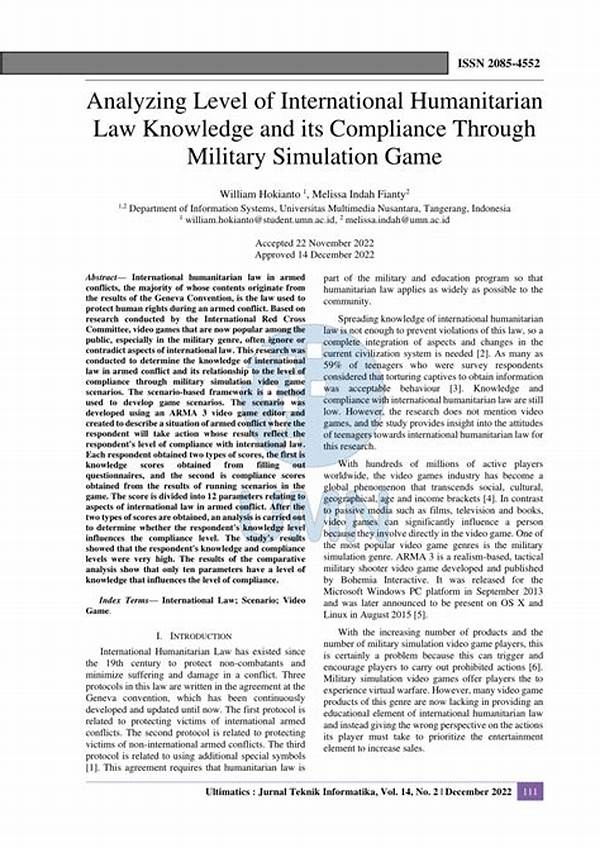Importance of Military Law Compliance Mechanisms
Military law compliance mechanisms are fundamental to ensuring that armed forces operate within the boundaries of national and international legal standards. These mechanisms serve as a critical framework for maintaining order and discipline within the military, thus facilitating the enforcement of justice and protection of human rights. They are designed to monitor, evaluate, and ensure adherence to laws, regulations, and ethical guidelines specific to military conduct. The implementation and effectiveness of these mechanisms are vital for upholding the integrity of military operations.
The significance of military law compliance mechanisms extends beyond the military environment as well. Compliance with military law demonstrates a nation’s commitment to the rule of law and its obligations under international law, including treaties and conventions concerning armed conflict and humanitarian principles. This compliance fosters trust and collaboration with international partners and strengthens a country’s reputation on the global stage. Furthermore, by ensuring that military personnel act within legal constraints, these mechanisms help to prevent abuses and misconduct, thereby protecting civilians and maintaining public support.
Consequently, military law compliance mechanisms are essential tools for preserving the moral and legal fabric of military organizations. They establish a systematic approach for identifying violations and implementing corrective measures, thereby promoting professional conduct. In sum, these mechanisms underpin the integrity, accountability, and legitimacy of military institutions, thereby reinforcing the principles of justice and peace.
Components of Military Law Compliance Mechanisms
1. Training Programs: Effective military law compliance mechanisms involve comprehensive training programs that educate military personnel on legal obligations and ethical standards.
2. Oversight Bodies: These mechanisms often include oversight bodies tasked with monitoring compliance and investigating alleged violations rigorously and impartially.
3. Reporting Systems: A robust reporting system allows personnel to report potential violations, ensuring that issues are addressed promptly and transparently.
4. Legal Frameworks: Military law compliance mechanisms are guided by well-defined legal frameworks providing clear guidelines for conduct and disciplinary measures.
5. Enforcement Procedures: Strong enforcement procedures are critical, ensuring that violations of military law are met with appropriate sanctions to deter future misconduct.
Challenges in Implementing Military Law Compliance Mechanisms
Implementing military law compliance mechanisms presents several challenges. One notable challenge is the resistance to change within hierarchical and tradition-bound military structures. Resistance can result in gaps in the application of compliance measures, impacting the effectiveness of these mechanisms. To address this obstacle, comprehensive education and training initiatives are necessary to cultivate a culture of compliance and understanding of the importance of legal adherence within the military.
Another significant challenge is ensuring that compliance mechanisms are adaptable to different operational environments, especially in the dynamic and often unpredictable nature of military engagements. It is imperative that compliance strategies are flexible enough to account for varying contexts while maintaining the core principles of legal and ethical conduct. Additionally, balancing operational effectiveness with strict adherence to legal standards can be complex, requiring a nuanced approach to rule enforcement that does not compromise military objectives.
Enhancing Military Law Compliance Mechanisms
Enhancing military law compliance mechanisms necessitates continuous evaluation and adaptation of existing frameworks to meet evolving legal standards and operational realities. Regular assessments of compliance mechanisms ensure that they remain effective in addressing current and potential challenges. Stakeholders must engage in persistent dialogue to identify areas for improvement and to foster an organizational culture prioritizing accountability and integrity.
Moreover, strengthening international cooperation and sharing best practices can bolster the efficacy of military law compliance mechanisms. Collaborative efforts among nations allow for the exchange of experiences and strategies in enforcing military justice, thus improving the global standards of military operations. Investments in technology and innovation can also play a significant role in enhancing compliance, offering new tools for monitoring and enforcing adherence to military law.
Military Law Compliance Mechanisms and Their Role in Leadership
Military law compliance mechanisms significantly influence leadership within military structures by delineating the ethical and legal expectations for command. Leaders bear the responsibility of modeling compliance and enforcing laws to maintain discipline and operational integrity. This role necessitates a deep understanding of the legal frameworks and the mechanisms in place to ensure compliance among subordinates.
Moreover, through the reinforcement of military law compliance mechanisms, leaders can cultivate trust and respect within their ranks. By exemplifying adherence to legal standards, military leaders establish themselves as credible and reliable figures, fostering an environment of transparency and mutual respect. This environment, in turn, contributes to enhanced unit cohesion and effectiveness in achieving mission objectives.
Conclusion
In conclusion, military law compliance mechanisms are indispensable to the governance and operation of military forces worldwide. They serve not only to uphold law and order within military institutions but also to project a nation’s commitment to international law and ethical conduct. The successful implementation of these mechanisms ensures that military personnel carry out their duties with integrity and respect for human rights, thereby safeguarding the principles of justice and peace.
Continual refinement of military law compliance mechanisms is essential for effectively addressing emerging challenges and reinforcing adherence to evolving legal standards. By prioritizing these mechanisms, military organizations can enhance their operational effectiveness while maintaining public trust and international legitimacy. Ultimately, military law compliance mechanisms are integral to preserving the values and principles that define just and honorable military conduct.





